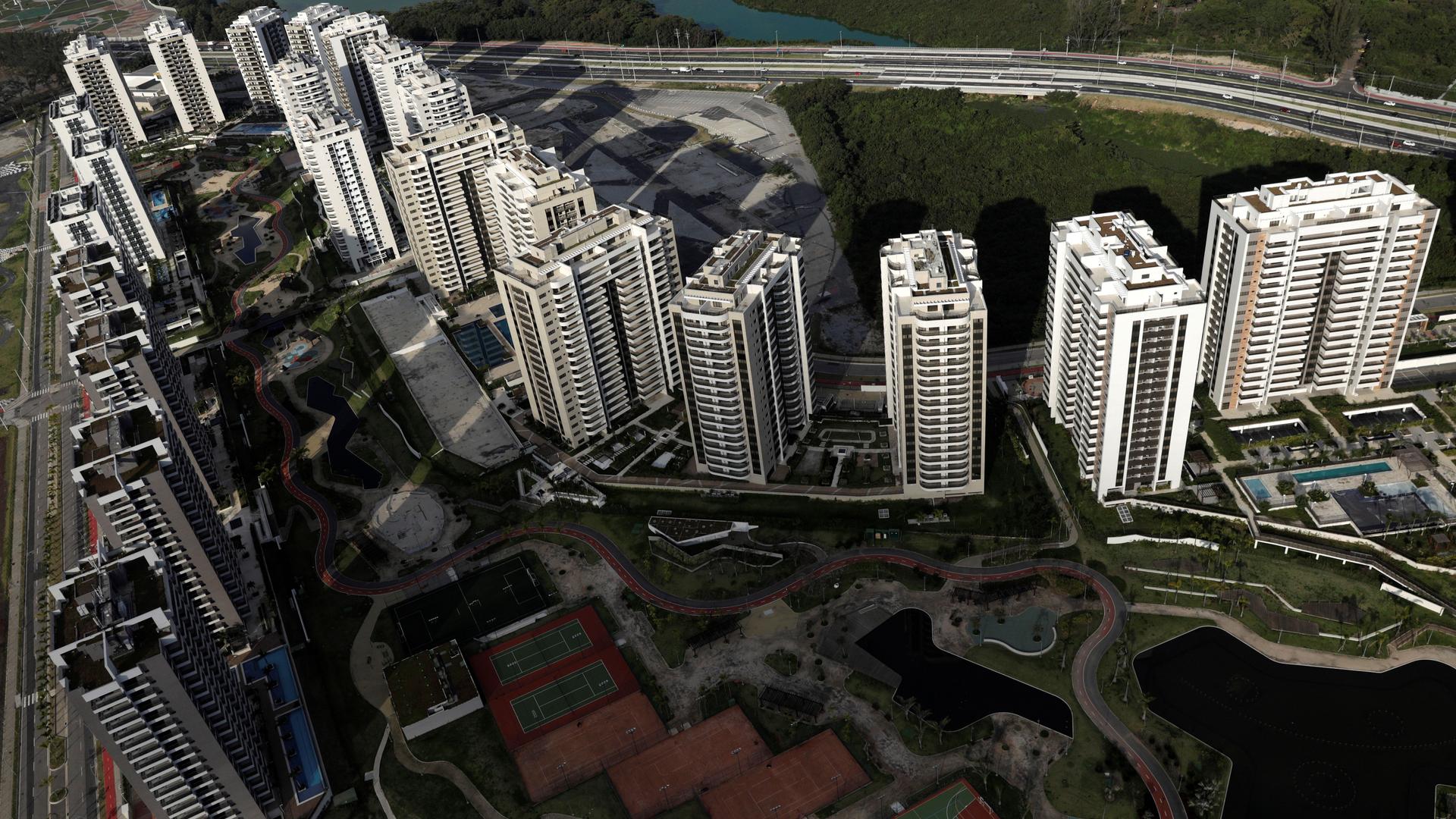An aerial view, taken on Aug. 1, 2017, shows the 2016 Rio Olympics athletes village, which was used for the 2016 Olympic Games.
Residents of Rio de Janeiro are spending its one-year Olympic anniversary processing the news that the State University of Rio, one of the nation’s best, has suspended classes for the second semester due to the budgetary crisis.
Thousands of police have been taken off Rio’s streets in the past year, city clinics are closing their doors, and there has been dismal interest in patronizing Rio’s $20 million Olympic golf course — built on an environmental reserve — and the almost completely unsold luxury housing that was once the athletes village.
The latest politician to be arrested in Brazil’s sweeping federal anti-corruption probe, Operation Car Wash, was Rio's ex-secretary of public works, who is being investigated for allegedly taking bribes for the new high-speed bus lines that were developed as part of the city’s Olympic legacy. The locations of these lines have been criticized for their orientation toward the wealthy suburb where Olympic Park was built, rather than along daily commuting routes where the majority of Rio residents face congestion.
Dozens of investigations at the state and federal level have now revealed details about ways the city’s Olympic transformation benefited companies and their political allies at the expense of resident input on what changes the city needed most. And spending on the games has exacerbated Rio’s state and city financial crises during Brazil’s worst recession on record.
Rio’s state budget was already poorly managed before the Olympics, according to State University of Rio international relations professor Maurício Santoro, who says the state is “run like an oil emirate” due to offshore oil production and dependence on high oil revenues. The drop in the price of oil contributed to the state’s economic collapse, but so, too, have billions spent on Olympic projects, Santoro says, which “served as a catalyst for a state fiscal crisis.”
Brazil currently has 13 percent unemployment, and in the first quarter of 2017, 4 out of 5 Brazilians who lost their jobs lived in Rio de Janeiro.
Rio's former mayor, Eduardo Paes, still describes a successful Rio Olympics on the international speaker circuit. He lauds the investment in plazas and museums in Rio’s previously rundown port area, which now draws visitors from across the city. Urban planners in Rio have been advocating for revitalizing this area and reorienting city life around it as far back as the 1910s. The birthplace of Rio samba and the historic Little Africa neighborhood can be found here. After Paes’s tenure, the region also includes a light rail line that moves slowly through still-congested traffic at 15 kilometers per hour.
Paes, under federal investigation, denies allegations that he took around $5 million in bribes tied to Olympic construction. He will go on record as the Rio mayor who evicted the most families from their homes due to city construction work, in a process that was condemned by the United Nations for violence and lack of transparency.
On Thursday in Rio, human rights and public security specialists met at the city’s office of Amnesty International to discuss the post-Olympics fallout. “We’ve been organizing against the consequences that mega-events have for this city since the 1992 Rio Earth Summit,” said human rights activist Monica Cunha. Cunha would have preferred for money that went to stadiums and bribes to instead have gone to solving “more urgent needs in the city, such as health, education and reforming an inhumane criminal justice system.”
The awarding of the 2028 Olympics to Los Angeles immediately following LA’s loss to Paris as a 2024 host has been viewed by scholars who study the games as a move to avoid another embarrassing bidding cycle in which potential host cities drop out due to citizen opposition. LA organizers pledge to carry out a low-cost Olympics, as they did to great praise in 1984.
Also as part of the preparation for the 1984 games, LA Police Chief Daryl Gates expanded police gang sweeps in the city, saying, “I think that people believe that the only [policing] strategy is to harass people and make arrests for inconsequential types of things. Well, that’s part of our strategy, no doubt about it.” This style of policing was a contributing factor to the Rodney King riots of 1992.
“People in future cities with the Olympics need to fight hard to make sure the changes that come with the games really benefit them,” said Cunha on Thursday. “That’s not what happened in Rio.”
